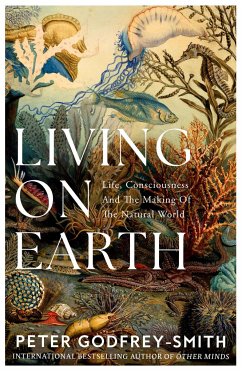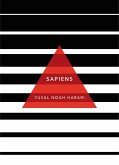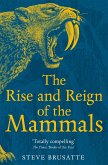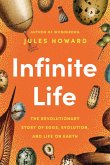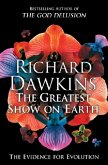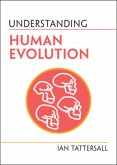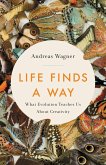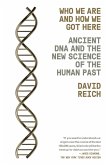The eagerly anticipated conclusion to Peter Godfrey-Smith's three-part exploration of the origins of intelligence on Earth, which began with the bestselling Other Minds in 2018 and continued with Metazoa in 2020.
The eagerly anticipated conclusion to Peter Godfrey-Smith's three-part exploration of the origins of intelligence on Earth, which began with the bestselling Other Minds in 2018 and continued with Metazoa in 2020.
Peter Godfrey-Smith, the scuba-diving philosopher, examined the evolution of sentience in Other Minds. In Metazoa he asked how that consciousness shaped and was shaped by animal bodies. Now, in Living on Earth, he takes that line of questioning a step further, asking, how has life shaped and been shaped by our planet?
He visits the largest living stromatolite fields, examples of how cyanobacteria began belching oxygen into the atmosphere as they converted carbon dioxide and water into living matter using the sun's light. The extraordinary increase in oxygen in the atmosphere resulted in an explosion in the diversity of life. And so began a riotous tangle of coevolution between plants and animals, as each changed the environment around them allowing others to utilise these new ecosystems and thus new species to evolve. From cyanobacteria, through algae on to ferns or trees or grasses, and from protists , through invertebrates and fish through the dinosaurs and on to birds and mammals - our planet has seen an explosion of life forms, all reacting to their environment and all creating new environments that allow other life to evolve.
In our own evolutionary line, an initially unremarkable mammal changed in new ways, evolving to come out of the trees to inhabit new savannas and then onto inhabit the whole planet. One of the most adaptable species ever found on Earth, and arguably the species causing the most change, humans are still part of this 3.8billion year history of life forms changing the world around them.
In Living on Earth, Godfrey-Smith takes us on a grand tour of the history of life on earth. He visits Rwandan gorillas and Australian bowerbirds, returns to coral reefs and octopus dens, considers the impact of language and writing, and weighs the responsibilities our unique powers bring with them, as they relate to factory farming, habitat preservation, climate change, and the use of animals in experiments. Living on Earth shows that Humans belong to the infinitely complex system that is the Earth, and our minds are products of that system, but we are also an acting force within it. We are creatures of Earth, but we hold Earth's future in our hands. It is a responsibility that we must all understand and accept.
The eagerly anticipated conclusion to Peter Godfrey-Smith's three-part exploration of the origins of intelligence on Earth, which began with the bestselling Other Minds in 2018 and continued with Metazoa in 2020.
Peter Godfrey-Smith, the scuba-diving philosopher, examined the evolution of sentience in Other Minds. In Metazoa he asked how that consciousness shaped and was shaped by animal bodies. Now, in Living on Earth, he takes that line of questioning a step further, asking, how has life shaped and been shaped by our planet?
He visits the largest living stromatolite fields, examples of how cyanobacteria began belching oxygen into the atmosphere as they converted carbon dioxide and water into living matter using the sun's light. The extraordinary increase in oxygen in the atmosphere resulted in an explosion in the diversity of life. And so began a riotous tangle of coevolution between plants and animals, as each changed the environment around them allowing others to utilise these new ecosystems and thus new species to evolve. From cyanobacteria, through algae on to ferns or trees or grasses, and from protists , through invertebrates and fish through the dinosaurs and on to birds and mammals - our planet has seen an explosion of life forms, all reacting to their environment and all creating new environments that allow other life to evolve.
In our own evolutionary line, an initially unremarkable mammal changed in new ways, evolving to come out of the trees to inhabit new savannas and then onto inhabit the whole planet. One of the most adaptable species ever found on Earth, and arguably the species causing the most change, humans are still part of this 3.8billion year history of life forms changing the world around them.
In Living on Earth, Godfrey-Smith takes us on a grand tour of the history of life on earth. He visits Rwandan gorillas and Australian bowerbirds, returns to coral reefs and octopus dens, considers the impact of language and writing, and weighs the responsibilities our unique powers bring with them, as they relate to factory farming, habitat preservation, climate change, and the use of animals in experiments. Living on Earth shows that Humans belong to the infinitely complex system that is the Earth, and our minds are products of that system, but we are also an acting force within it. We are creatures of Earth, but we hold Earth's future in our hands. It is a responsibility that we must all understand and accept.
'An exquisite account of intelligence across species ... Living on Earth is consistently rewarding, packed with insights and invitations to reflect, and blessed with some exquisite writing' Guardian
'Clever, compassionate and often deeply moving ... An excellent finale to an ambitious trilogy exploring the evolution of intelligence' New Scientist
'Wide-ranging ... [and] dynamic ... An extraordinary journey' Observer
'Godfrey-Smith is overflowing with new ways of looking at old issues, and it is always a pleasure to be introduced to them' Literary Review
'A hugely important book ... Sweeping, careful, and courageous ... Godfrey-Smith writes with grace, humility, and wisdom' Anil Seth, director of the Centre for Consciousness Science at the University of Sussex and author of Being You: A New Science of Consciousness
'Only Peter Godfrey-Smith could write this book. It offers a vast, kaleidoscopic, and immensely thought-provoking overview of the development of life on Earth' Sean Carroll, professor at Johns Hopkins University and author of Quanta and Fields
'In Living on Earth, Peter Godfrey-Smith combines vivid and compelling descriptions of the natural world, unexpectedly fascinating scientific results, and philosophical arguments that are exceptionally clear and accessible as well as deep and profound' Alison Gopnik, professor at the University of California, Berkeley and author of The Gardener and the Carpenter
'An essential read for understanding the legacy of the spot we're standing in right now, and its future' David Eagleman, neuroscientist at Stanford University and author of Incognito and Livewired
'Yields rich new insights on the nature of life' Michael S. Gazzaniga, professor of psychology at the University of California, Santa Barbara and author of The Consciousness Instinct
'Clever, compassionate and often deeply moving ... An excellent finale to an ambitious trilogy exploring the evolution of intelligence' New Scientist
'Wide-ranging ... [and] dynamic ... An extraordinary journey' Observer
'Godfrey-Smith is overflowing with new ways of looking at old issues, and it is always a pleasure to be introduced to them' Literary Review
'A hugely important book ... Sweeping, careful, and courageous ... Godfrey-Smith writes with grace, humility, and wisdom' Anil Seth, director of the Centre for Consciousness Science at the University of Sussex and author of Being You: A New Science of Consciousness
'Only Peter Godfrey-Smith could write this book. It offers a vast, kaleidoscopic, and immensely thought-provoking overview of the development of life on Earth' Sean Carroll, professor at Johns Hopkins University and author of Quanta and Fields
'In Living on Earth, Peter Godfrey-Smith combines vivid and compelling descriptions of the natural world, unexpectedly fascinating scientific results, and philosophical arguments that are exceptionally clear and accessible as well as deep and profound' Alison Gopnik, professor at the University of California, Berkeley and author of The Gardener and the Carpenter
'An essential read for understanding the legacy of the spot we're standing in right now, and its future' David Eagleman, neuroscientist at Stanford University and author of Incognito and Livewired
'Yields rich new insights on the nature of life' Michael S. Gazzaniga, professor of psychology at the University of California, Santa Barbara and author of The Consciousness Instinct

